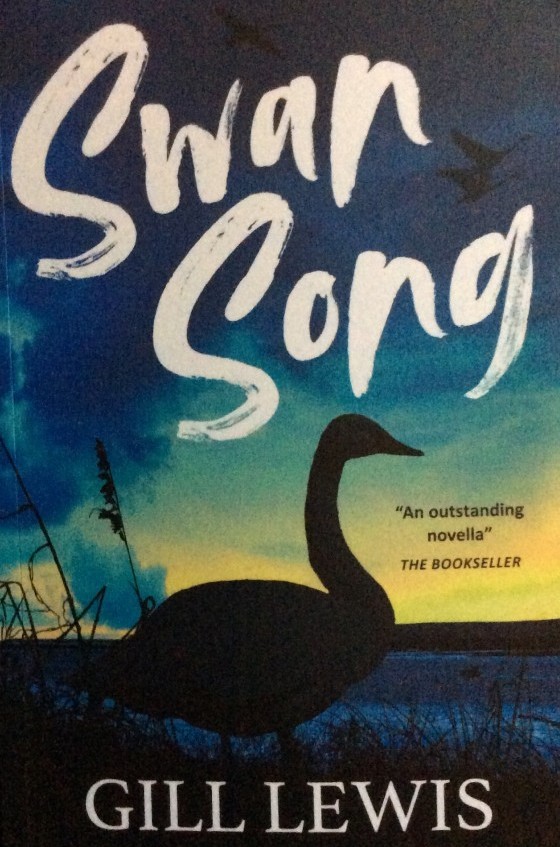Inspiring Young Readers
 posted on 11 Feb 2021
posted on 11 Feb 2021
Swan Song by Gill Lewis
Dylan is used to living life in an urban environment where he has managed to get himself into trouble at school. He has never really fitted in there and been in regular clashes with his teachers. Could it be due to his dad leaving home or are there other reasons too?
When he is permanently excluded because of fighting with another boy, he and his mother decide to try living with his granddad in a tiny Welsh village ‘at the very end of the world.’ At first he can’t imagine how he is going to cope with the dreary boredom of it all. How is he supposed to manage with no internet, no TV, no Xbox (which he has destroyed beyond repair in a rage)and nothing to distract him? He doesn’t feel inclined to do anything other than stay in bed under the duvet all day.
Although it is written from Dylan’s perspective, I couldn’t help feeling sorry for his exasperated mother who cannot understand why he hasn’t flourished at grammar school after working so hard to get there. She has decided to home school him instead, and we all know that isn’t going to be an easy task for either of them. Going to live in Wales by the sea sounds quite a cosy solution to their problems but she clearly has a difficult relationship with her father and hasn’t had much to do with him for many years. The poor man must have also felt rather daunted at the thought of sharing his home with the two of them.
But it seems that the old man is keen to forgive any misunderstandings, and to get to know his family again. We get hints that he had himself experienced depression after the death of his wife and so understands the need for sensitivity and patience with Dylan. I liked the way that he takes his problems seriously and doesn’t judge him or try to berate him for past mistakes. He just reaches out to include him in his fishing expeditions and to help him to adjust to the much slower pace of life. Dylan soon learns to steer a boat, to look at the big sky, and to be thrilled with the bottlenose dolphins that swim beside them. Maybe this new life might be ok after all.
Despite these many unfamiliar experiences, nothing can prepare him for what Grandad describes as ‘The greatest show on earth’. The Whooper swans fly in from Iceland and arrive in spectacular fashion and Dylan begins to feel a heady freedom and hope for the future. He finds out that Grandad is known locally as ‘The Swan Man’ because of his expertise and he also learns to explore the area using an old bike and eventually finds a friend who shares his growing interest in watching the swans. Together, and with the help of Granddad, they rescue a swan that has been injured by a fishing line and nurse it back to health before releasing it back to the wild.
It takes him several months to gain confidence and to try catching up with his Maths and Science with the help of a family friend, but he succeeds. He also reads lots of interesting books with advice from the local librarian and thrives despite having stopped formal education. He is enjoying learning from real life and being able to apply his knowledge. I can see how this would inspire some interesting discussion with young readers. What is school for exactly? Could children perhaps learn more from being at home doing interesting practical activities?
When it seems that the beautiful Swan Fields might be under threat from a greedy developer, Grandad is completely heartbroken and Dylan resolves to do all he can to help him to save the habitat. They are out in the boat together when he has to make some urgent decisions about steering the boat through a terrible stormy sea, because Grandad is suddenly frighteningly unwell with what turns out to be a massive stroke. The journey back to the safety of the harbour is guided by the swan that he had helped to save earlier that year which flies above the boat. Recovery from the stroke is very slow and discouraging because he is so devastated at the thought of the Swan Fields being lost forever. Dylan realises that he might need encouragement and support from the whole community. He and his new friend come up with a creative campaign designed to save Grandad and the Swan Fields.
I loved this story about sorrow, healing and the power of activism. The award winning author manages to convey so much emotion and passion for nature in what is a very concise novella. As ever the publisher, Barrington Stoke has succeeded in capturing the interest of emergent, reluctant and dyslexic readers through compelling storytelling.
Strongly recommended.
Karen Argent
February 2021